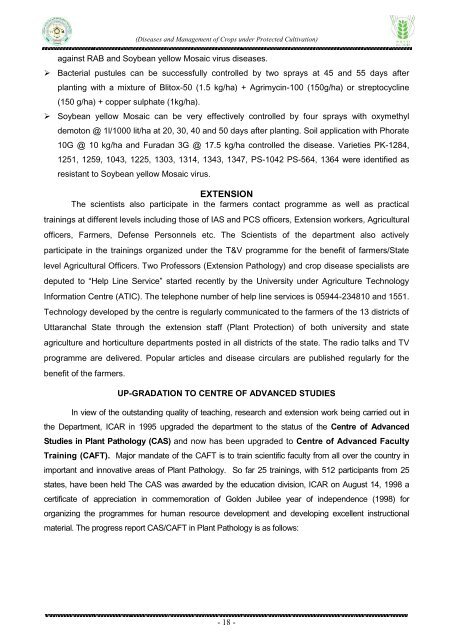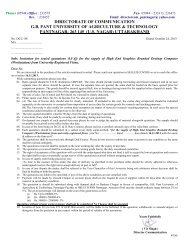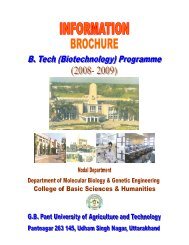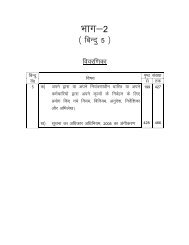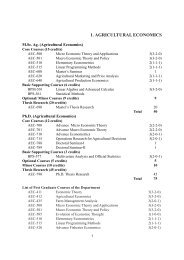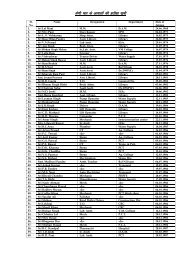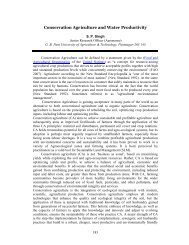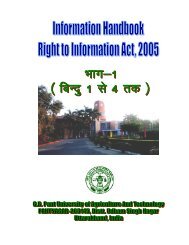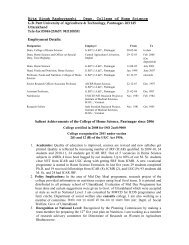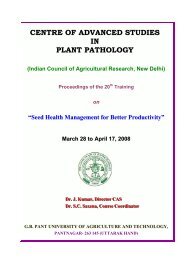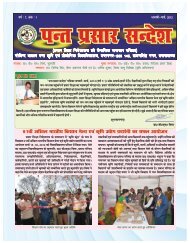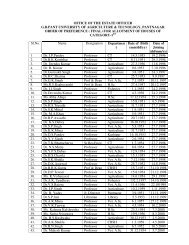Diseases and Management of Crops under Protected Cultivation
Diseases and Management of Crops under Protected Cultivation
Diseases and Management of Crops under Protected Cultivation
You also want an ePaper? Increase the reach of your titles
YUMPU automatically turns print PDFs into web optimized ePapers that Google loves.
(<strong>Diseases</strong> <strong>and</strong> <strong>Management</strong> <strong>of</strong> <strong>Crops</strong> <strong>under</strong> <strong>Protected</strong> <strong>Cultivation</strong>)<br />
against RAB <strong>and</strong> Soybean yellow Mosaic virus diseases.<br />
‣ Bacterial pustules can be successfully controlled by two sprays at 45 <strong>and</strong> 55 days after<br />
planting with a mixture <strong>of</strong> Blitox-50 (1.5 kg/ha) + Agrimycin-100 (150g/ha) or streptocycline<br />
(150 g/ha) + copper sulphate (1kg/ha).<br />
‣ Soybean yellow Mosaic can be very effectively controlled by four sprays with oxymethyl<br />
demoton @ 1l/1000 lit/ha at 20, 30, 40 <strong>and</strong> 50 days after planting. Soil application with Phorate<br />
10G @ 10 kg/ha <strong>and</strong> Furadan 3G @ 17.5 kg/ha controlled the disease. Varieties PK-1284,<br />
1251, 1259, 1043, 1225, 1303, 1314, 1343, 1347, PS-1042 PS-564, 1364 were identified as<br />
resistant to Soybean yellow Mosaic virus.<br />
EXTENSION<br />
The scientists also participate in the farmers contact programme as well as practical<br />
trainings at different levels including those <strong>of</strong> IAS <strong>and</strong> PCS <strong>of</strong>ficers, Extension workers, Agricultural<br />
<strong>of</strong>ficers, Farmers, Defense Personnels etc. The Scientists <strong>of</strong> the department also actively<br />
participate in the trainings organized <strong>under</strong> the T&V programme for the benefit <strong>of</strong> farmers/State<br />
level Agricultural Officers. Two Pr<strong>of</strong>essors (Extension Pathology) <strong>and</strong> crop disease specialists are<br />
deputed to “Help Line Service” started recently by the University <strong>under</strong> Agriculture Technology<br />
Information Centre (ATIC). The telephone number <strong>of</strong> help line services is 05944-234810 <strong>and</strong> 1551.<br />
Technology developed by the centre is regularly communicated to the farmers <strong>of</strong> the 13 districts <strong>of</strong><br />
Uttaranchal State through the extension staff (Plant Protection) <strong>of</strong> both university <strong>and</strong> state<br />
agriculture <strong>and</strong> horticulture departments posted in all districts <strong>of</strong> the state. The radio talks <strong>and</strong> TV<br />
programme are delivered. Popular articles <strong>and</strong> disease circulars are published regularly for the<br />
benefit <strong>of</strong> the farmers.<br />
UP-GRADATION TO CENTRE OF ADVANCED STUDIES<br />
In view <strong>of</strong> the outst<strong>and</strong>ing quality <strong>of</strong> teaching, research <strong>and</strong> extension work being carried out in<br />
the Department, ICAR in 1995 upgraded the department to the status <strong>of</strong> the Centre <strong>of</strong> Advanced<br />
Studies in Plant Pathology (CAS) <strong>and</strong> now has been upgraded to Centre <strong>of</strong> Advanced Faculty<br />
Training (CAFT). Major m<strong>and</strong>ate <strong>of</strong> the CAFT is to train scientific faculty from all over the country in<br />
important <strong>and</strong> innovative areas <strong>of</strong> Plant Pathology. So far 25 trainings, with 512 participants from 25<br />
states, have been held The CAS was awarded by the education division, ICAR on August 14, 1998 a<br />
certificate <strong>of</strong> appreciation in commemoration <strong>of</strong> Golden Jubilee year <strong>of</strong> independence (1998) for<br />
organizing the programmes for human resource development <strong>and</strong> developing excellent instructional<br />
material. The progress report CAS/CAFT in Plant Pathology is as follows:<br />
- 18 -


